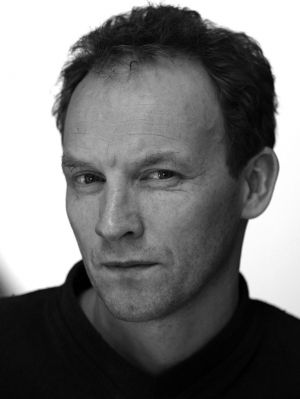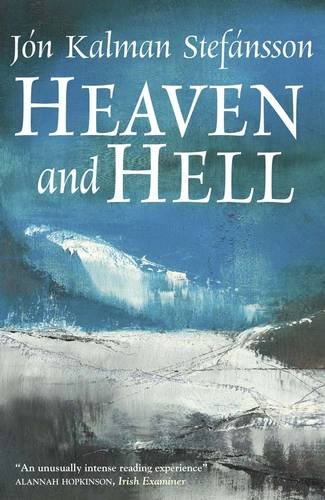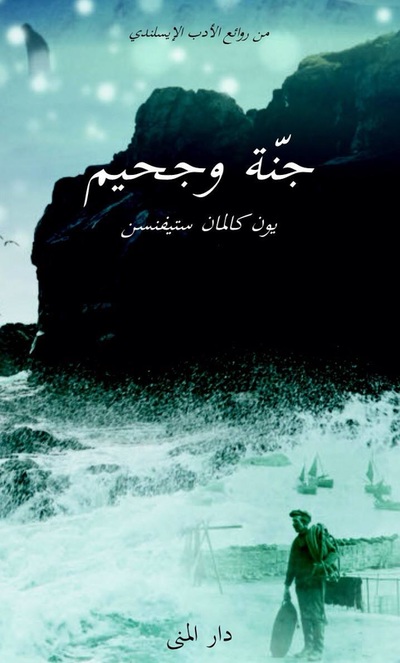Icelandic Author Jón Kalman Stefánsson: a book only starts to exist when the reader arrives17/5/2015 by Rana Asfour  Last week, after I had settled myself into one of the white leather couches arranged elegantly at the Icelandic stall at Abu Dhabi International Book Fair awaiting Nordic author Jón Kalman Stefánsson to arrive for our hastily arranged interview, I quickly leafed through his book ‘Heaven & Hell’ in its Arabic edition "جنّة وجحيم". It is the first book of his trilogy, and the recent translation into Arabic, by Dar al-Muna, makes it the 20th territory in which he is published. Born in 1963 in Reykjavik, Stefánsson owes his international breakthrough to his Trilogy About The Boy; A story about a boy whose friend, Bardour, dies while out on a fishing boat in stormy winter weather. Bardour had forgotten to wear his waterproofs, too engrossed in a reading of a borrowed book titled ‘Paradise Lost’. The boy, highly affected by his friend’s passing resolves to return the book to its owner and then join his friend in death. This resolve takes ‘the boy’ on a perilous yet spiritual journey that changes much of what he had initially set out to do. This is the author’s first time in Abu Dhabi, and as such it was a no-brainer that the weather would be the first thing that we would discuss as we both settled into our chat with a coffee that seemed to materialise as if out of nowhere thanks to his doting agent Monica Gram. ‘Stepping off the plane in Abu Dhabi is quite an exceptionally memorable one for me. It honestly felt like hitting a wall of heat. It was possibly because I arrived on a night flight and wasn’t expecting it to be so hot that I was so ‘surprised’ by it. However, in spite of the heat, I have managed to visit the Sheikh Zayed Mosque, and the nearby market and enjoyed them very much’. Due to time constraints, I jumped right in and enquired how he was feeling regarding the release of his book in Arabic taking into consideration the cultural differences between Iceland and the Arab World and whether that would have any impact on Arabic speaking readers appreciating his books? ‘First of all I am very excited naturally. As a nationality, I am an Icelander and a big part of that will come through my writings. But as a writer I have come to realise that people are the same everywhere. Besides, when I write, I do not think about who my reader is or where he/she comes from. I only think about the writing itself and how good I want it to be. That is what readers really want. Whether or not the story is well written and whether or not it has made them learn something new about others or their themselves'. However, I interject, doesn’t a translation always take away something from the original? Does that not bother him? ‘I am actually very keen on translations and some of my really good friends are translators. I believe they are very important people in the world because they are the bridges between worlds and they help us to understand each other. I also find that translators are poets in their own right because they have to understand and deeply feel and connect with a language. As such it is important that a translator be very good. Undeniably, something is always lost in translation but there is also much gained as well’. Moving on to writing techniques and the characters of his novels, I am keen to know how much control he has of his writers or whether they eventually take on a life of their own. In other words, has a character ever forced him to change an ending? ‘That’s a good question’, he answers, ‘There are some instances, like when in my book ‘Summer Light, And Along Comes the Night’ the ending was very sad and I had not wanted it to be so, but I absolutely knew that I had to finish it like that. There was no other way, and so I followed my heart although if I had listened to the characters it would have ended differently’. ‘While writing you have to expect the unexpected and accept the fact that you cannot control what you write. Everyone has something buried inside them that I think will unexpectedly come out in the writing. The writer must accept that. I sometimes feel that the book is writing me and not me writing the book’, he adds with a shrug of the shoulders. As if as an afterthought he adds, ‘I cannot control what characters I like and I think that a book only starts to exist when the reader arrives. They set it free’. I ponder his words for a few seconds and decide I like the active role that he’s assigned the readers in bringing the book into existence and am as such spurred on to ask how many more readers one can recruit to the cause. There is the constant harbinger from various sources that reading is on the decline. So what can be done? ‘Children’s books have never been more important as they are now. If you can offer children today well-written, exciting, funny books then you create a generation that will read. Additionally, and something that is very important to the process is that the parents should read to the children. This interaction imprints an enjoyable memory in the mind of a child that will always be linked to books. Once they are adults, reading will come to mean a positive, happy time and they are more likely to turn to it to relax or de-stress. To develop future readers, work must start in childhood’. Having read Stefánsson’s first two books of the trilogy, in English, and found them to be very enchanting, lyrical, almost poetic (he has indeed described himself in one interview as a poet writing prose) I had already formed the idea that his writings were indicative of someone quite spiritual and in tune with the universe. As he answers my questions, I find that indeed Stefánsson conducts himself with the ease of someone who has in fact cracked the code of what humans are all about. I get the sense that he is observant and interested in all that takes place around him. He has been known to urge not only writers but also readers to doubt and question everything around them. He is keenly aware of the effect all this has on his writings. ‘As a writer I am constantly taking in, sometimes without even knowing. I see something, or visit somewhere and then I come back and take notes. Everything I experience comes into my writing one way or another’. A book inspired by the UAE I cut in? ‘Who knows!’ he answers with an amicable smile and was that a twinkle in the eye? ‘Maybe one day’. About the author:
Jón Kalman Stefánsson is an Icelandic author born in Reykjavik in 1963. Over the last few years he has created an individual and enchanting fictional world in a series of related novels and short stories. Two of these works, ‘Summer Behind the Slope’ and ‘Of Tall Trees and Time’ were nominated for the Nordic Council’s Literary Prize, and in 2005 Jón Kalman received the Icelandic Literature Prize for his work ‘Summer Light, Enter Night’, an unusual collection of related stories and fragments. Stefánsson had his international breakthrough with the trilogy about the boy, that includes the titles ‘Heaven and Hell’, ‘The Sorrow of Angels’, and ‘The Human Heart’ for which he gained international recognition and numerous prizes and which is going to be turned into a feature film.
0 Comments
Your comment will be posted after it is approved.
Leave a Reply. |
Archives
March 2021
|






 RSS Feed
RSS Feed
